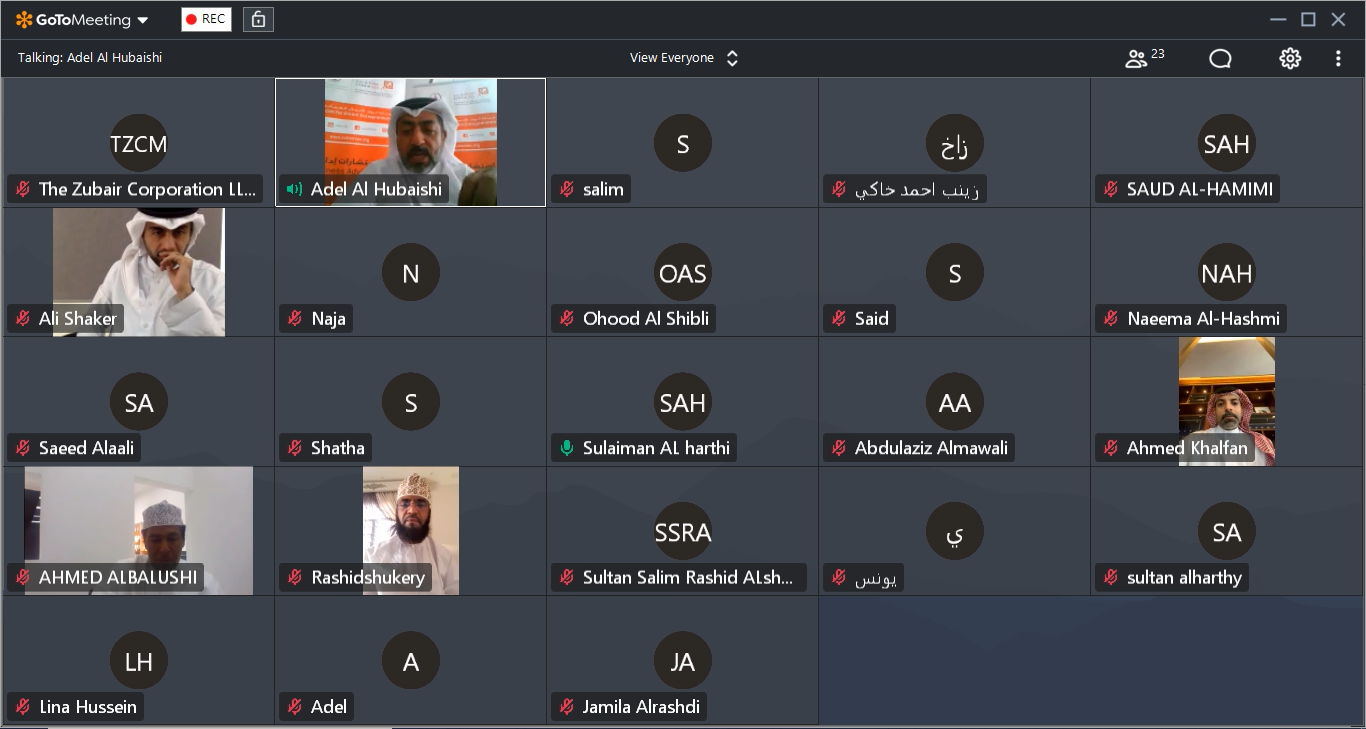Date: July 12, 2020
With an intention to empower members and SMEs to be better prepared, Zubair Small Enterprises Centre (Zubair SEC) organised a virtual ‘Tajribati’ session on the ‘importance of diagnosing health condition of businesses’.
In the view of the COVID-19 situation, Zubair SEC’s recently introduced online version of ‘Tajribati’ sessions to connect industry experts with start-up owners and entrepreneurs to exchange views, discuss common challenges and share best practices. For the last five years, Zubair SEC has been organising the popular ‘Tajribati’ series to support young entrepreneurs and owners of small and medium enterprises through transparent dialogue, advocacy, and networking.
Sulaiman bin Hamad Al Harthy, Deputy CEO and Chief Business Officer at Oman Arab Bank and Ahmed Khalfan, Treasurer, Bahrain Small and Medium Enterprises Society, were the key speakers at the session which focused on the impact of diagnosing the health condition of the businesses.
The session was attended by members of Zubair SEC and non-member owners of small and medium enterprises and entrepreneurs from Oman and the Kingdom of Bahrain.
The discussion focussed on best standards and code of practices for businesses while stressing on the significance of using diagnostic results to sustain the business or make strategic decisions. The participants discussed topics including financial liquidity, operational efficiency and net profitability. Entrepreneurs and members who participated articulated on how they encountered the challenges faced by their businesses.
The session also shed light on the importance of a realistic business plan, as evaluation criteria starts from the business plan and the diagnostic criteria for the business’s health condition contributes to verifying the effectiveness of the project’s operational strategies and processes, not just its success. Participants discussed how every organisation, regardless of its size, must have mechanisms to diagnose the health status of the business, and the only way to assess the effectiveness of these actions is through diagnosis. Analysing the situation allows executives to know what works and what needs to be modified or completely removed from the system. Diagnosing contributes to comprehending the level of business performance and identifies the strengths and weaknesses. Besides, it also helps businesses to understand the potential risks facing them in the future. It assists them in identifying the hidden opportunities that can be utilised for the benefit of their business and help develop business goals.
During the session, guest speakers emphasized that an important indicator of the health of a business is that the applied business plan – regardless of the business size – should be realistic and reflecting the market dynamics for the business, and should be continuously revised and updated till the business reaches a plan that can actually achieve the desired success. They also explained the importance of financial discipline and adhering to financial principles, highlighting that cash flow is one of the essential survival factors for any business and so when a realistic well-structured business plan is in place, there will be better cash flow that contributes to more sustainability. And while discussing other key indicators of the health of a business, guest speakers shed light on the Return on Investment (ROI) and Cost to Income Ratio as two of the main indicators to keep monitoring and using for strategic development decisions of any business.
Commenting on the session, Sulaiman Hamad Al Harthy, Deputy CEO and Chief Business Officer at Oman Arab Bank explained: First I would like to express my gratitude for the organizers of this session and my appreciation for them inviting me to take part as a speaker in this session which I believe is important on two levels: first, once I confirmed my participation, I started reviewing my resources to update myself on success elements for business projects and what can help them overcome challenges, especially in the difficult times we’re going through. As a financing institution it is very important for us to always be updated on the businesses conditions around us. On another level, this dialogue initiative is important due to the expertise it hosted from Bahrain and the Sultanate from whom we all learnt and benefited. As for the questions that I was asked, I believe that an essential part of any business is to be built on solid commercial principles such as having a dynamic business plan and feasibility study that keeps getting updating to reflect changes in market dynamics. Another element I shed light on is large debts; as I have observed that businesses that have better chances to succeed are the ones that rely on less loans and many of the businesses that default would have overwhelmed themselves with huge loans. Of course the experience in running businesses is also fundamental; as some might think that it is easy to run a certain business without experience and expertise, but will be surprised after a while that there are many hidden aspects that they should have been aware of in advance”.
Speaking at the session, Ahmed Khalfan, Treasurer, Bahrain Small and Medium Enterprises Society said, “We know that in addition to having serious consequences on people’s health, COVID-19 is extensively impacting businesses and the economy. Even though the COVID-19 situation is grim, it is important to be optimistic. It is vital for new businesses to adapt while also preparing to emerge stronger. This is possible by analysing the situation they are in and identifying solutions to come out stronger. Diagnosis and a robust strategy for the future is crucial.”
Zubair SEC recently organised other virtual Tajribati sessions to discuss measures and steps the SME sector must take to prepare for post COVID-19. The sessions also discussed the importance of online marketplaces and e-commerce in helping SMEs achieve sustainability and maintaining their business during difficult times.

